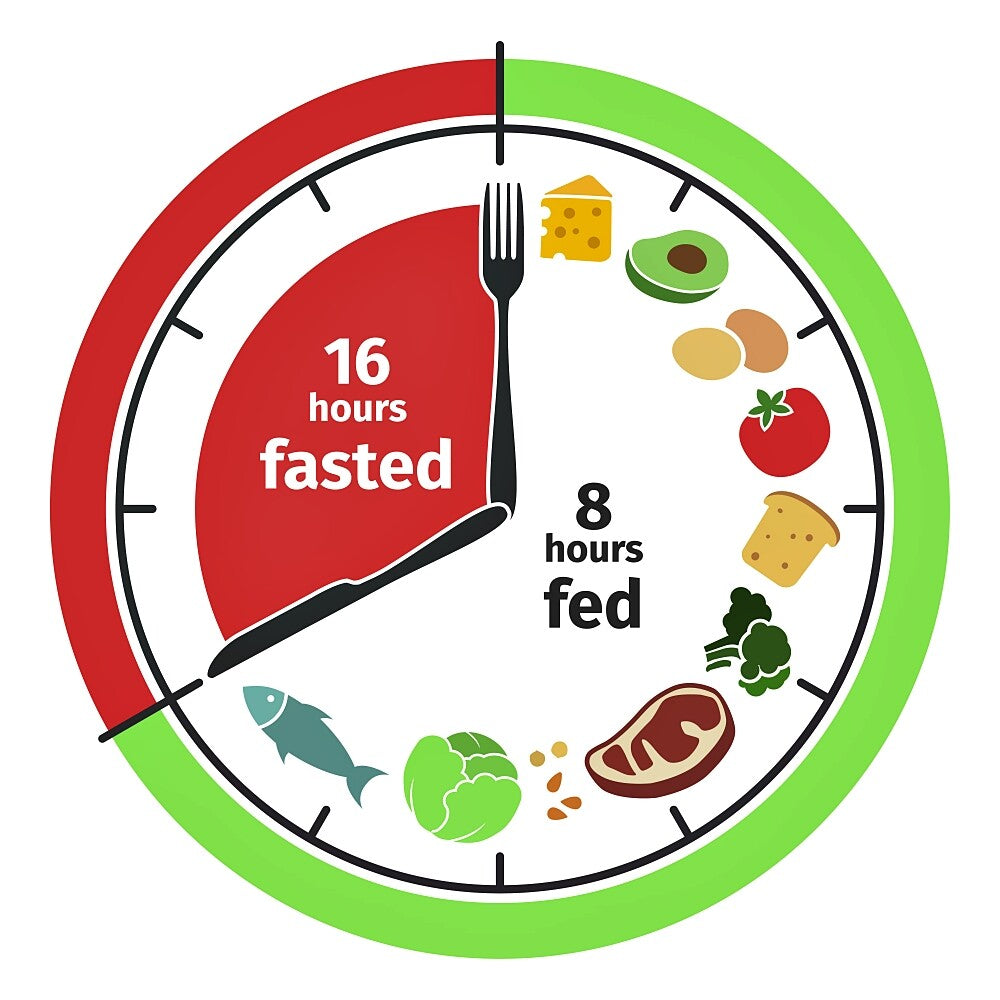
Unveiling the Truth Behind Intermittent Fasting
Intermittent fasting (IF) has surged in popularity as a strategy for sustainable weight loss, captivating millions with its promise of simplicity and effectiveness. Unlike traditional diets that demand constant calorie counting, IF focuses on when you eat rather than what, creating windows of eating and fasting. But amid the buzz, myths abound, often deterring people from trying this approach. This post debunks common misconceptions using scientific evidence and provides a practical guide to harnessing IF for weight loss sustainable in the long term. Backed by studies showing average losses of 7-11 pounds over 10 weeks, IF can be a game-changer when done right. Let's separate fact from fiction and explore how to make it work for you.
Myth: Intermittent Fasting Tanks Your Metabolism
One pervasive myth is that IF slows metabolism, leading to weight gain once you stop. Critics claim skipping meals puts the body into "starvation mode," conserving energy. However, research debunks this: isocaloric studies in metabolic chambers show IF yields similar weight loss to continuous calorie restriction without reducing energy expenditure. In fact, IF can boost metabolic health by improving insulin sensitivity and reducing inflammation. A meta-analysis of randomized trials found IF reduces waist circumference by about 1 cm compared to non-fasting diets in overweight adults. Far from harming metabolism, IF supports sustainable weight loss by enhancing fat burning during fasting periods, where the body taps into stored energy. Short-term fasting preserves resting metabolic rate, making it a viable option for long-term health without the feared slowdown.
Myth: You'll Lose Precious Muscle Mass
Another fear is excessive muscle loss, with naysayers arguing fasting catabolizes muscle for fuel. Evidence counters this: studies show people on IF lose similar lean mass to those on calorie-restricted diets, especially when combined with resistance training and adequate protein. In one review, IF participants retained muscle while shedding 2.5-9.9% body weight. Young men fasting 16 hours daily lost fat but maintained muscle, per animal and human trials. To optimize, pair IF with strength exercises—aim for 1.6-2.2 grams of protein per kg of body weight during eating windows. This myth stems from confusion with prolonged starvation, but controlled IF promotes fat loss over muscle, aiding weight loss sustainable through preserved strength and metabolism.
Myth: Intermittent Fasting Triggers Eating Disorders
Skeptics warn IF promotes disordered eating by encouraging restriction. Yet, no studies link IF to developing eating disorders in healthy adults; trials screened out those with histories, and none reported new cases. In fact, IF often improves eating habits by fostering mindfulness around hunger cues. A large body of research affirms its safety, with participants maintaining balanced diets during eating periods. However, those with past eating issues should avoid it, consulting professionals first. For most, IF enhances control, not chaos, supporting sustainable weight loss without psychological harm. It's about timing, not deprivation, and can even reduce binge tendencies by regulating appetite hormones like ghrelin.
Myth: It's Unsafe for Hormones or Women
Concerns about hormonal disruption, especially in women, abound—claims of lowered estrogen, fertility issues, or libido. Science says otherwise: IF doesn't affect estrogen, testosterone, or related hormones in trials. A review of human studies found no impact on reproductive hormones in females or males. While pregnant or breastfeeding women should skip it, healthy adults see benefits like better insulin regulation. One study noted IF lowers blood sugar efficiently, aiding metabolic health without hormonal fallout. Women may prefer gentler methods like 14:10 fasting to align with cycles, but evidence supports IF's safety across genders for sustainable weight loss, debunking fears of endocrine chaos.
Getting Started: Your Practical IF Blueprint
Ready to try IF? Begin gradually to build habits for weight loss sustainable. Start with a 12-hour fast—eat dinner by 7 p.m. and breakfast at 7 a.m.—easing into longer windows. Hydrate with water, tea, or black coffee during fasts; zero-calorie drinks curb hunger. Track progress: aim for 3-8% body weight loss in 3-12 months, matching study averages. Focus on nutrient-dense meals: veggies, lean proteins, whole grains, and healthy fats. Weight loss tips include meal prepping to avoid impulsive choices. Listen to your body—if fatigued, shorten fasts. Consistency trumps perfection; sustainable weight loss comes from integrating IF into lifestyle, not as a quick fix.

Selecting the Ideal IF Method for You
Popular methods vary: 16:8 (16-hour fast, 8-hour eat) suits many, yielding 1-4% weight loss in adults. Alternate-day fasting (eat normally one day, 500-600 calories next) offers flexibility but may be tougher. 5:2 involves two low-calorie days weekly. Choose based on schedule—busy professionals love 16:8 for skipping breakfast. Beginners: start 14:10. Studies show all yield similar results to calorie restriction, with better adherence. Weight loss tips: experiment, but stick 4-6 weeks before switching. Pair with apps for reminders, ensuring sustainable weight loss through personalization.
Boosting Results: IF Meets Exercise
Combine IF with movement for amplified benefits. Fasted workouts enhance fat oxidation; studies show better endurance in alternate-day fasters. Resistance training twice weekly preserves muscle, countering any loss. Cardio during eating windows sustains energy. A trial found IF plus exercise reduces obesity markers more effectively. Weight loss tips: time workouts end-of-fast for post-meal refuel. Stay hydrated—dehydration mimics hunger. This synergy promotes sustainable weight loss, improving cardiometabolic health like lowered cholesterol.
Long-Term Strategies: Beyond the Fast
IF shines for initiation, but sustainability requires more. Build habits: mindful eating, portion control, diverse nutrients. Studies link IF to reduced inflammation and better gut health, aiding longevity. Avoid rebound by transitioning gradually if pausing. Weight loss tips: monitor macros—40% carbs, 30% protein, 30% fats. Social support boosts adherence; share meals in windows. Evidence shows IF prevents weight regain better than crash diets. Focus on whole foods for micronutrients, ensuring sustainable weight loss feels effortless.
Embracing IF for Lifelong Wellness
Debunking myths reveals IF as a safe, evidence-based tool for sustainable weight loss. With facts like 91% higher adherence in some patterns and proven metabolic perks, it's no fad. Start small, stay informed, and consult doctors if needed. By integrating these weight loss tips, you'll achieve not just slimmer figures but vibrant health. Remember, consistency and balance key the journey—fast smart, live fuller.
Discover the power of sustainable weight loss with D Squared WorldWide's premium wholesale products! Drawing from insights on intermittent fasting, debunk common myths like metabolism slowdown or muscle loss—our CBD, Hemp, Delta-8, and Mushroom-infused edibles, beverages, and topicals support enhanced fat burning, improved insulin sensitivity, and reduced inflammation for long-term results. Backed by studies showing 7-11 pounds lost over 10 weeks, these natural supplements complement IF protocols seamlessly. Offer your retailers science-based weight loss tips through our white-label services. Elevate your brand today—schedule a call with D Squared WorldWide to discuss wholesale opportunities and customize your inventory for success!
Reference:
1. Ahmed, N., Farooq, J., Siddiqi, H., Meo, S., Kulsoom, B., Laghari, A., … & Pasha, F. (2021). Impact of intermittent fasting on lipid profile–a quasi-randomized clinical trial. Frontiers in Nutrition, 7. https://doi.org/10.3389/fnut.2020.596787
2. Alnasser, A. and Almutairi, M. (2022). Considering intermittent fasting among saudis: insights into practices. BMC Public Health, 22(1). https://doi.org/10.1186/s12889-022-12908-4
Berk, Y., Ünver, Ş., & Avlayan, H. (2021). The effect of intermittent fasting and exercise on some physiological parameters. PJMHS, 15(9), 2793-2798. https://doi.org/10.53350/pjmhs211592793



